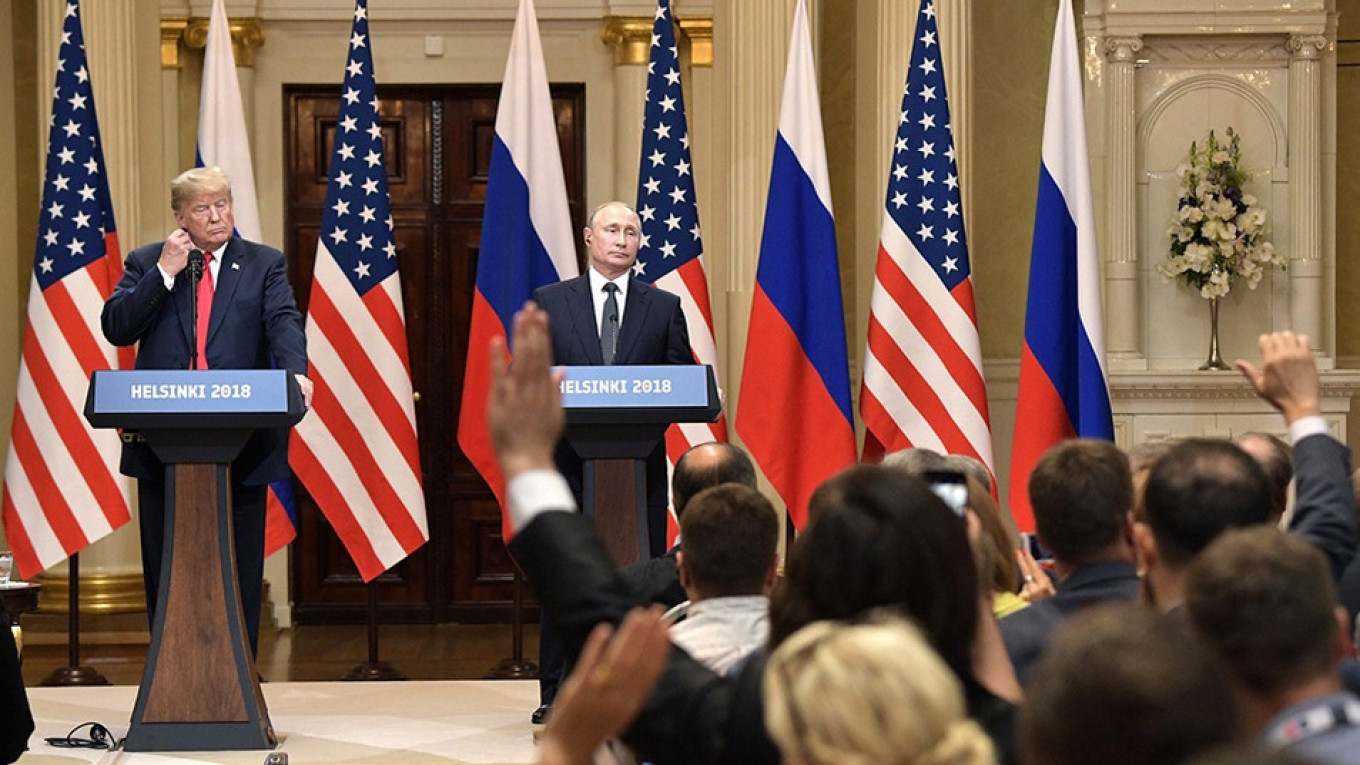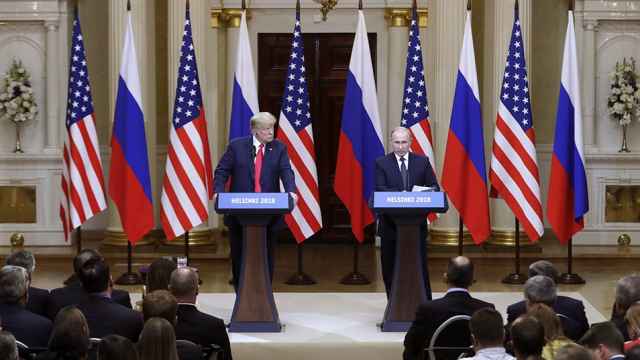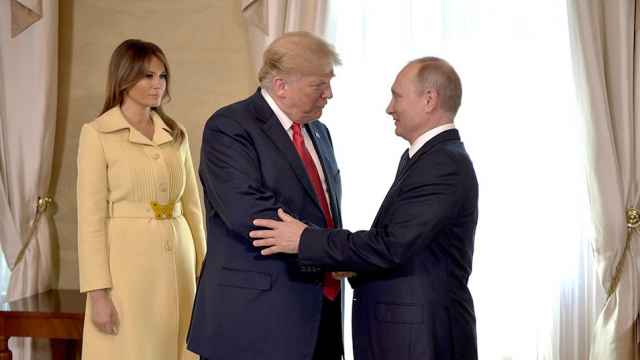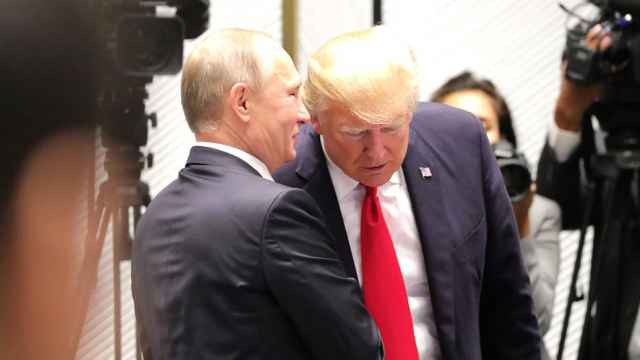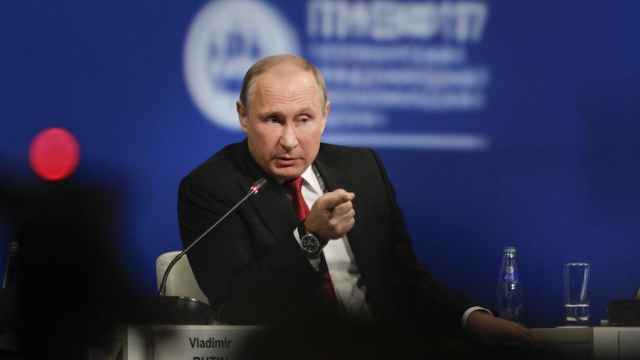The main impression from the meeting between the Russian and U.S. presidents in Helsinki is that Vladimir Putin has apparently decided to back Donald Trump in his confrontation with most of the American political establishment.
The Western media is used to presenting Putin and Trump as two peas in a pod, but in Helsinki, the two leaders really did put on a united front against the Democrats, Robert Mueller’s Special Counsel investigation into alleged Russian meddling in the 2016 U.S. presidential election that brought Trump to power and that selfsame U.S. media.
This is a new phenomenon that significantly broadens the concept of the Hybrid War that the United States and Russia have been waging for the last four years. The symbolic front line runs not along state borders and their respective blocs, as it did during the Cold War, and not between the government and the information weapons of each country, as it did until now, but within the countries themselves. The Hybrid War is becoming more hybrid.
Only time will show how justified the Kremlin’s public bet on the current occupant of the White House turns out to be. On the eve of the meeting in Helsinki, Trump looked noticeably stronger and more confident than he did a year ago ahead of his meeting with Putin on the sidelines of the G20 summit in Hamburg. His support base has not collapsed, the economy is showing good results and a team is firming up of presidential aides who are acting more consistently and are devotedly loyal to their boss.
The Democrats pale in comparison. It appears they have not yet managed to grasp the lessons of their defeat in the 2016 election. A positive agenda for the country has not been formed, and the group of declared leaders has so far failed to impress. The prospect of impeaching Trump in this situation looks extremely unlikely. His reelection in 2020, on the other hand — which seemed utterly unthinkable a year ago — can no longer be excluded.
At the same time, it’s worth remembering that politics in the United States is a rollercoaster on which the position of those at the top — or those who aspire to get there — can change at dizzying speed. Trump’s speech at his joint press conference with Putin made headlines for him publicly doubting the competence and honesty of the American security services. The relationship between the intelligence agencies and the 45th U.S. president has been rocky right from the start, but if it deteriorates into an open (yet hidden) confrontation, that war could be dangerous not only for the head of state and the state itself, but for international security, too. Having publicly entered internal U.S. politics, Russia must be prepared for unpleasant surprises.
Trump said at the summit that he would rather take a political risk in pursuit of peace than risk peace in pursuit of politics. That’s a very commendable position, but we must keep in mind the possibility of failure and its likely consequences. We can only hope that Putin understands that. But he also probably understands that after Helsinki, Russia’s previous formal detachment from U.S. internal affairs is in tatters. For the foreseeable future, Russia has thrown its lot in with Trump.
Of course, for proponents of the conspiracy theory that Trump and Russia are in cahoots, this is nothing new: they never believed in any detachment. But after Helsinki, that mythical plot is morphing into an only too real political alliance of the two presidents.
Critics will shrug and say that this alliance has long been zealously forged by Trump’s U.S. opponents themselves, and that Russia can’t treat friendly nations and those who hate it in the same way. Cynics would add that Putin is in no way tied to Trump, and could disassociate himself from him at any moment for the sake of greater instability in the United States, which is his main goal. These arguments are, however, less important than the recognition that Russia appears to have entered into the civil political confrontation in America.
There are precedents for this. In the nineteenth century Russia pointedly supported the northern U.S. states against the slave-owning south, and for much of the twentieth century Moscow retained its own political entity across the ocean: the Communist Party of the U.S.A. For its part, the United States organized a military intervention in the Russian North and Far East during the Civil War that followed the 1917 revolutions, and following the end of the Cold War got closely involved in Russia’s post-Communist transformation. The current situation is different in that the field of combat is the corridors of power of the main world power. The stakes could hardly be higher.
Perhaps the safest approach for Russia in its relations with the United States would have been strategic patience, based on the conviction that getting involved in the internal affairs of other states, particularly large and powerful ones like the United States, is dangerous. Russia could have given the Americans time — five or six years — to get their internal affairs in order, to partially forget or deaden their grievances against Russia, rotate their elite and then set about formally normalizing relations amid changed international conditions. Moscow could have waited. After all, there is nothing that urgently requires close cooperation with the United States.
But that’s not how things turned out. The active approach prevailed. Right when relations between the Kremlin and the White House were seeing a turn toward dialogue and occasional cooperation, the Hybrid War between the United States and Russia has reached a new level. Of course this only seems like a paradox. In reality, both developments are closely intertwined.
We have to work on the basis of reality rather than wishful thinking. Now that Moscow has jumped into the fray, it needs not only better knowledge and understanding of American internal political realities than it has ever had before, but also infinite caution. Compared to what was revealed to the world in Helsinki, accusations of hacking attacks and leaking of obtained materials look like the harmless games of patriots.
Dmitry Trenin is director of the Carnegie Moscow Center which translated a version of this article originally published on RBC news site. The views and opinions expressed in opinion pieces do not necessarily reflect the position of The Moscow Times.
A Message from The Moscow Times:
Dear readers,
We are facing unprecedented challenges. Russia's Prosecutor General's Office has designated The Moscow Times as an "undesirable" organization, criminalizing our work and putting our staff at risk of prosecution. This follows our earlier unjust labeling as a "foreign agent."
These actions are direct attempts to silence independent journalism in Russia. The authorities claim our work "discredits the decisions of the Russian leadership." We see things differently: we strive to provide accurate, unbiased reporting on Russia.
We, the journalists of The Moscow Times, refuse to be silenced. But to continue our work, we need your help.
Your support, no matter how small, makes a world of difference. If you can, please support us monthly starting from just $2. It's quick to set up, and every contribution makes a significant impact.
By supporting The Moscow Times, you're defending open, independent journalism in the face of repression. Thank you for standing with us.
Remind me later.



